- Home
- David Lubar
Strikeout of the Bleacher Weenies Page 10
Strikeout of the Bleacher Weenies Read online
Page 10
The video played. A man stood at the edge of the rooftop on a skyscraper that towered above everything else in sight. The screen was split, with one view coming from a camera on the roof, and the other from a camera in the man’s helmet.
The man jumped. The plunge was spectacular—especially with the split-screen images. When the man was roughly halfway down, Hector realized he needed air. His lungs were crying out for him to take a breath.
He inhaled.
Or tried to.
He couldn’t breathe. As promised, the Differnet video had taken his breath away. After a moment of panic, Hector killed the video.
“Phew,” he said on his first exhalation, which followed his deep and greedy inhalation the instant his breath was returned to him. “That was different.”
He saw another video, this time involving stunt jets, which promised to make your jaw drop.
Being a very slow learner, Hector clicked the image. His jaw did drop. Not to the floor, fortunately, or off his face. It just dropped to the point where anyone seeing his face would have no doubt that he was startled.
This is weird, Hector thought as the video ended and his mandible ascended. He scrolled among the vast and various offerings on the Differnet.
What this toddler does will make you laugh so hard, you’ll wet your pants!
“No thanks,” Hector said.
When you see the hilarious prank these students pull on their classmate, milk will shoot out of your nose.
“Yeah, right,” Hector said. He clicked PLAY.
The stunt was hilarious.
Milk shot out of his nose.
Fortunately, he felt it coming and turned his head aside, so he didn’t drench his keyboard.
He bypassed offers to roll on the floor, laugh a certain part of his body off, scream with delight, or gasp in amazement. Then, he saw a video of his favorite thing of all, a clip of skateboarding stunts.
Hector, who was in the habit of clicking on anything even marginally interesting without giving his actions too much thought, clicked PLAY while he was reading the caption: This clip of two dudes jumping over moving cars on their skateboards will absolutely slay you.
On-screen, the two dudes jumped. Offscreen, Hector was slain. Absolutely.
Hector’s tragic death will literally make you cry oceans of tears. It will blow your mind. It will change your life forever. It will … Wait. No. It probably won’t. Never mind.
HEALED
Nobody would tell me what was wrong with me. I knew I was sick. My body ached like I’d been tackled by fifteen kids. Fifteen times. My head felt fuzzy. I didn’t have any energy. I could barely get out of bed. I didn’t even want to get out of bed. Mom took me to one doctor after another. They spewed big words at her, but not anything that I could figure out how to spell well enough so I could look it up on the Internet. No two of the doctors seemed to think I had the same thing.
Finally, Mom heard about Dr. Spavisker. “They call him the Miracle Man,” she told Dad. Her voice dropped lower when she spoke the last two words, as if they were some sort of sacred spell. She held up a magazine that had an article about him.
“I hope they’re right,” Dad said.
“What’s wrong with me?” I asked, for the thousandth time.
“Oh, nothing, sweetie,” Mom said, for the thousandth time. But she looked away when I tried to watch her face and find a clue in her eyes to the truth.
Dr. Spavisker had a clinic in Arizona, about 150 miles away from where we lived. My parents took me there the next day. It was a long drive, but I napped for most of it, so I didn’t really notice the time passing.
They put me in a room with another kid. He looked really sick, like he could die at any moment. That scared me. I realized that was what I must look like. I mean, I saw myself in the mirror every day, but I don’t think anyone really sees himself when he looks in a mirror. If something changes slowly, you might not even notice it at all. I checked around the room for a mirror, but didn’t see one. I guess that was probably a good thing.
But I really wanted to find out if I looked as bad as the kid in the other bed. So I asked if I could use the bathroom.
“Of course, Donovan,” Mom said. “This is your room now. Until you get better.”
I went into the bathroom, closed the door, and tried to really see my face. I almost wish I hadn’t. My goldfish died last year. Its eyes looked just like mine. Flat. Lifeless. I didn’t want to stare at myself anymore. I went back to the room.
Dr. Spavisker had joined my parents. He was an old guy, with white hair on the sides of his head and thick glasses. “Ah, Donovan,” he said, holding out his hand, “I’m so glad you’re here. Don’t you worry. I’ll see that your parents get back the son they thought they lost, as good as new. Better than new!”
He gave my shoulder a squeeze, then turned to my dad. “We’ll start running our tests immediately. I’ll keep the two of you informed at every step.”
Mom and Dad said good-bye, then headed off. Instead of saying anything to me, Dr. Spavisker went to the window and looked out. I guess he was watching them leave. They’d wanted to stay in a hotel nearby, so they could visit me, but they’d been told it was better to go home and wait. I could hear a car pulling away. After the sound faded, the doctor stepped back from the window and said, “Let’s get started.”
I glanced down at my right arm. “Are you going to be taking a lot of blood?” I’d been stuck so many times, I was surprised I had any blood left.
“No, I don’t need blood samples.” He reached into his shirt pocket and pulled out some sort of tube. He uncapped the tube and removed a stick. I saw it had a cotton swab at the end.
“Open wide,” he said.
I opened my mouth. I was so used to doing whatever the doctors told me, I would pretty much follow any order. Open wide, breathe in, spit out, swallow, look at the ceiling, and so on. He rubbed the swab against the inside of my cheek, then put it back in the tube and slipped it into his pocket.
“That’s it?” I asked.
“That’s it. All of our work is based on very sophisticated DNA testing and analysis.” He pointed to the bed. “Get comfortable. It will be at least a week or two before we have any results.”
A week or two? I looked for some way to kill a bit of time. My roommate was sleeping. There was a bookcase next to my bed with a collection of paperbacks. There was also an old computer with some games. “Internet?” I asked.
“Sorry. We’re too far from the city, and nobody is willing to run cable out here. There aren’t any cell towers, and the mountains block the satellite signals. But most of our patients discover they don’t really miss it after a day or two. We get a newspaper, so you can keep up with the world. And several magazines.”
“Well, that’s great,” I muttered. I suspected I had a good chance of dying of boredom before the doctor figured out anything. I grabbed a book and plopped down on the bed.
The time did pass pretty painlessly, mostly because I slept a lot. The other kid, Bradley, didn’t talk much. We said “Hi” to each other at one point. I might have said “Cool” when we saw an Apache helicopter fly past.
They always locked our door at night. I thought that was kind of weird. Then, on my fourth or fifth night, the guy who locks the doors got distracted and forgot to close ours.
I really didn’t think there was anything to see. But I was bored. Night and day were all the same. I slept, I woke, I slept some more. So it wasn’t surprising that I woke up in the middle of the night. I slipped out through the doorway, into the corridor.
I found there were five other rooms on the floor, each with two kids. There was one floor above me, and one below. I checked both. There were five more rooms above, with kids. There were offices and labs on the first floor. I also found a door to a basement.
It was creepy going down there, but I’d been sick for so long, I really didn’t have enough energy for fear. At least, not until I got down there and saw the vats.<
br />
Yeah, vats.
They were big ones, twice the size of a bathtub, made of thick, clear glass, and filled with a pale-green liquid. They took up the whole basement.
Kids floated in them.
Not just any kids.
I saw myself. And I saw my roommate.
He was full size. I was smaller, though it was hard to tell how much. The glass and the liquid distorted the images. My fingers and toes didn’t seem fully formed. But I could recognize my face.
I got out of there and hurried back to the room.
Clones … I thought. Dr. Spavisker wasn’t healing anyone. He was growing clones. Growing them really quickly, somehow.
And then what?
He couldn’t just hand a clone over to some parents and say, “Here’s your kid, as good as new.” Not without doing something about the clone’s mind.
Maybe he transplanted the brain.
I felt the skin of my skull shiver at that thought. Were brain transplants even possible?
All of a sudden, I really missed the Internet.
But forget brain transplants—cloning itself wasn’t possible, as far as I knew. Not for a person. Definitely not for a person you could grow in a week or two. But there they’d been, right in front of me. Maybe a brain transplant was possible, too.
Or maybe Dr. Spavisker told the parents that the cure had caused brain damage. Here’s your son. Sorry he doesn’t remember much. But at least he’s healthy.
I slipped back to my room and sat in my bed, waiting for the sun to rise and hoping I’d wake up from this nightmare.
But morning came, and I had to face the truth that the vats hadn’t been a dream. I looked over at Bradley. Based on the development of his clone, he’d be cured before me. I had to find out if he stayed the same.
“Good morning,” I said when he woke up.
“Morning, Donovan,” he said.
“I hate that name,” I said, using the lie I’d invented during the night. “My friends call me Chuck, because I used to throw up a lot.” I figured that would be easy to remember. “It started out as ‘Upchuck,’ but got shortened to just plain old ‘Chuck.’”
“Morning, Chuck,” he said. “What’s up?” He gave me a weak smile to show he was making a joke.
For the next two days, I talked to him often enough to reinforce that name. It was now in his mind—part of the data in his brain. To him, I was Chuck. If I managed to see him after he was cured, I’d be able to test his memory. And if his memory was intact, I could stop worrying and let my brain, or my memories, or whatever, be put in a healthy body.
I hoped it happened soon. I was getting weaker every day. On the third day after I’d become “Chuck,” I could hardly get out of bed. Bradley was even worse.
The next morning, they wheeled him out. Late that night, they brought him back in. He was asleep, or unconscious, but even so, I could tell he was healthier. His face wasn’t that of a dying kid. His head was bandaged. I guess maybe, just maybe, they’d taken Bradley’s brain from his sick body and put it in his clone’s healthy body.
Bradley didn’t wake until late the next morning. Right when he started to stir, my parents came into my room.
“We’ve found a better place for you,” my mom said. “A doctor who can fix you right away.”
“This is taking too long,” my dad said. “We don’t think we can trust Dr. Spavisker. There’s something creepy about this place.”
On the next bed, Bradley opened his eyes. He sat up like a kid who did fifty pushups and a hundred jumping jacks before breakfast. He looked like he could run a marathon.
“Bradley,” I said. “How do you feel?”
“Great,” he said.
“See,” I told my parents. “They fixed him. They’ll fix me next.”
“They’ll fix you right up, Chuck,” Bradley said. He laughed.
“Chuck?” Dad said. He and Mom exchanged looks. “Something must have happened to that poor boy’s brain. Why is he calling Donovan ‘Chuck’?”
“Because Chuck throws up all the time,” Bradley said. He let out another laugh.
“Let’s get you out of here,” Mom said. She ran to the closet where my clothes were. “There’s no time to waste.”
“But…” I tried to argue. I tried to explain that Dr. Spavisker could fix me. I was too weak to put together more than a couple words. They took me away. We’re driving to a new place. I hope that doctor can make clones fast. Real fast.
STUNT YOUR GROWTH
Ricky was running through the mall at top speed when the mall cop made a grab for him.
“No running,” the mall cop shouted.
No contest, Ricky thought. He dodged, twisted, stutter-stepped, and dashed away from the clutching hands, laughing. He put on an extra burst of speed, just to drive home the reality that he was uncatchable, then slowed his pace once he no longer heard the gasping, wheezing sounds of pursuit or the pathetic slap of clumsy footfalls against the mall’s plastic fake wood floor.
He turned a corner by the pretzel shop and dropped down to a regular walk, scanning the windows of the sneaker store and pizza place as he headed for the exit.
“Hey, kid…”
Ricky nearly jumped out of his skin when he felt the tap on his shoulder. He looked back, ready to harness more energy and make a dash for the exit. But it wasn’t a mall cop. It was a guy in a flashy Hawaiian shirt, with heavy gold chains around his neck, glittery rings on every single finger, and a pair of the latest sunglasses perched on his face.
“What?” Ricky asked. He didn’t know much about jewelry, but the glittery stuff the guy had on looked pretty expensive, and the sunglasses were definitely the type that cost a fortune.
“Here.” The man handed Ricky a business card.
Ricky read the name, and then the title. Buster Grogan, Stunt Coordinator. He spoke the second part. “Stunt coordinator?”
The man nodded. “I’m in charge of stunts for movies. We’re shooting one just outside of town. It’s an action flick. I need a kid who can run and dodge, like you did back there. You’re the perfect height and weight for the job.”
“I’d be in a movie?” Ricky asked.
“For sure. And you’d get paid.”
“How much?” Ricky asked.
The man told him. Ricky whistled. He rarely whistled, but it was a lot of money. A whole lot of money. Enough for a fistful of sunglasses. “What do I have to do?”
“Run.”
“I can do that,” Ricky said.
“Do you know the river canyon, out past the old Parker ranch?” the man asked.
“Sure do,” Ricky said.
“Be there tomorrow morning at 7:15. Wear blue jeans.”
Ricky thought of last fall, when he’d gone out for football. “Do I need permission from my parents?”
“No point bothering them,” the man said. “Parents don’t understand much about this sort of thing. And they tend to be overprotective.” He gave Ricky a wink and walked off.
The next morning, Ricky slipped out after breakfast and rode his bike to the river canyon. Be careful, he told himself. It could be some sort of trick. He planned to approach the area cautiously, and leave lots of room to turn around and dash off if he saw anything that made him nervous. But as he got close, his heart sped up in a good way. He saw trucks, trailers, cameras, and lots of people. There was no doubt a movie was being shot.
When Ricky reached the edge of the set, Buster Grogan waved at him and walked over. “Hey, right on time. You ready?”
“Yeah. Sure. I think so.” Ricky still had no real idea what he was supposed to do. He knew stunt people did dangerous things. That was fine. He loved danger. He figured he’d find out the details soon enough.
“Here, put this on.” The man handed him a green zip-up jacket and a red ball cap. He led Ricky to the edge of the canyon, then pointed toward a spot about a quarter of the way down the face of the cliff, where a woman was placing a small red cone on a ledge. �
��See that?” he asked.
“Yeah.”
“That’s your starting point,” Buster Grogan said.
“So the star ran the first part for the camera?” Ricky asked. He wanted to show that he knew how this worked. The star would get filmed doing the safe stuff, before the slope got too steep. Then the stunt person—the stunt kid, in this case—would take over for the dangerous part.
“Yup. We have the first part on film,” Buster Grogan said.
Ricky was sorry he’d missed seeing that. Far off, way below them, he spotted another kid, wearing jeans, a green jacket, and a red hat, limping away from the bottom of the canyon. “Who’s that?” he asked.
“That—oh, he’s just a stand-in for the star. We use him to make sure everything is in focus and the lighting is right. So, are you ready to thrill the crowds?”
“Absolutely.” Ricky made his way down the slope to the cone.
The woman was standing to the side of the ledge now, out of camera range. She pointed at the cone, then held out her hand. “Toss it here.”
Ricky tossed the cone to her, then waited. He knew what was coming next.
“Action!” someone cried.
Here I go! Ricky thought. He started to race down the cliff. His enthusiasm drowned out the small voice in his brain that yelled about the danger of sprinting along a steeply slanted surface. He only traveled several steps before he lost his balance.
He stumbled, staggered, skittered, and clambered, making a heroic effort to remain on his feet. He managed to do that until the midpoint of the drop, when he made a swipe at a small scrub tree that jutted from a crack in a boulder. He missed, totally lost his balance, and fell. He rolled, bounced, tumbled, plummeted, and slid the rest of the way down.
Numb, stunned, and slowly realizing he was covered with small and large cuts and bumps, Ricky staggered to his feet.
There was a guy waiting there. “I don’t think I can do that again,” Ricky said.
“No worries,” the man said. “We figured it would take five or six kids for a complete shot. But you did so well, we might only need four.” He held out a hand to lead Ricky down the path toward a car. “Let’s pick up your bike. Then, I’ll get you home. What’s your address?”

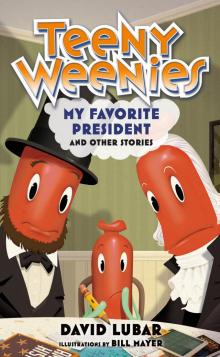 Teeny Weenies: My Favorite President
Teeny Weenies: My Favorite President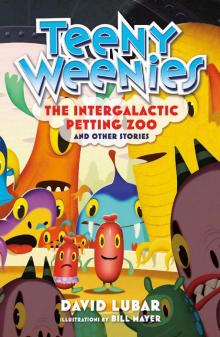 Teeny Weenies: The Intergalactic Petting Zoo
Teeny Weenies: The Intergalactic Petting Zoo Teeny Weenies: The Eighth Octopus
Teeny Weenies: The Eighth Octopus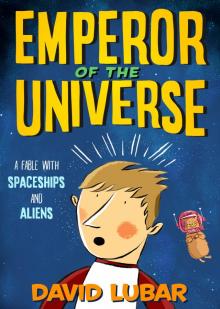 Emperor of the Universe
Emperor of the Universe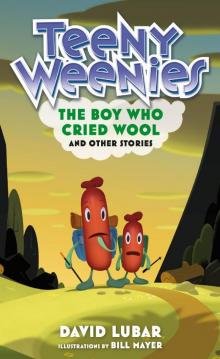 Teeny Weenies: The Boy Who Cried Wool
Teeny Weenies: The Boy Who Cried Wool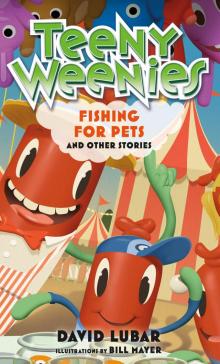 Teeny Weenies: Fishing for Pets
Teeny Weenies: Fishing for Pets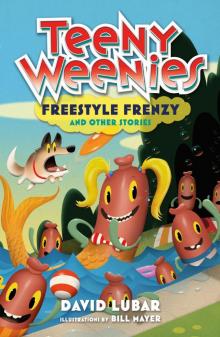 Teeny Weenies: Freestyle Frenzy
Teeny Weenies: Freestyle Frenzy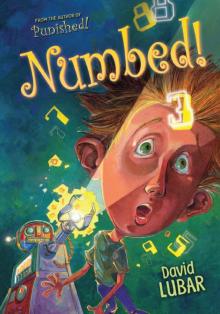 Numbed!
Numbed!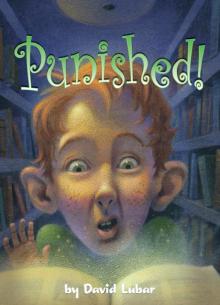 Punished!
Punished!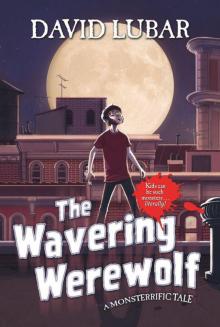 The Wavering Werewolf: A Monsterrific Tale (Monsterrific Tales)
The Wavering Werewolf: A Monsterrific Tale (Monsterrific Tales)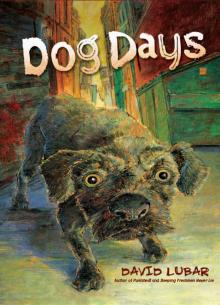 Dog Days
Dog Days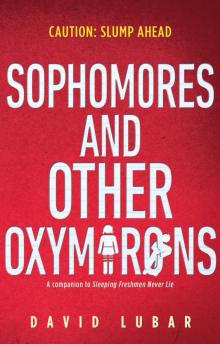 Sophomores and Other Oxymorons
Sophomores and Other Oxymorons The Psychozone
The Psychozone My Rotten Life
My Rotten Life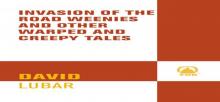 Invasion of the Road Weenies
Invasion of the Road Weenies In the Land of the Lawn Weenies
In the Land of the Lawn Weenies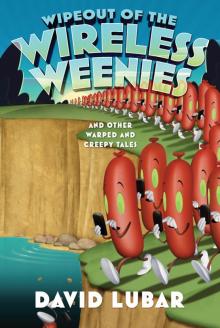 Wipeout of the Wireless Weenies
Wipeout of the Wireless Weenies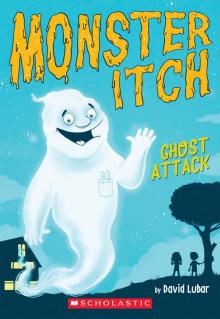 Ghost Attack
Ghost Attack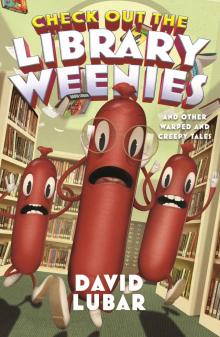 Check Out the Library Weenies
Check Out the Library Weenies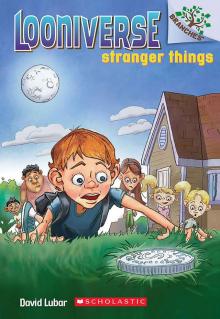 Looniverse #1: Stranger Things (A Branches Book)
Looniverse #1: Stranger Things (A Branches Book)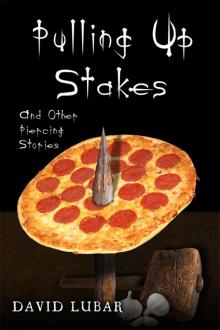 Pulling up Stakes and Other Piercing Stories
Pulling up Stakes and Other Piercing Stories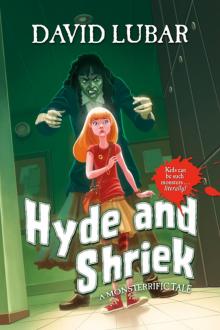 Hyde and Shriek
Hyde and Shriek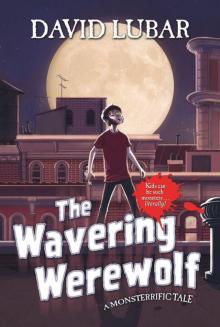 The Wavering Werewolf
The Wavering Werewolf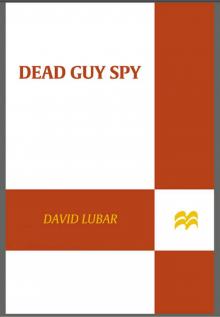 Dead Guy Spy
Dead Guy Spy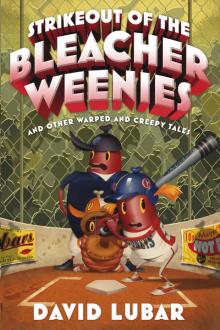 Strikeout of the Bleacher Weenies
Strikeout of the Bleacher Weenies The Big Stink
The Big Stink The Battle of the Red Hot Pepper Weenies
The Battle of the Red Hot Pepper Weenies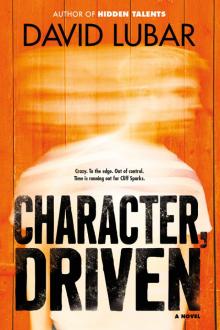 Character, Driven
Character, Driven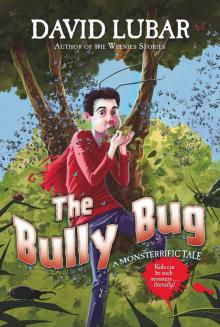 The Bully Bug
The Bully Bug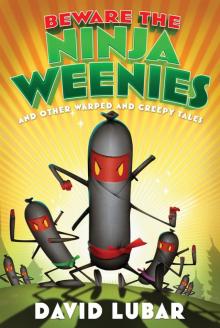 Beware the Ninja Weenies
Beware the Ninja Weenies Extremities: Stories of Death, Murder, and Revenge
Extremities: Stories of Death, Murder, and Revenge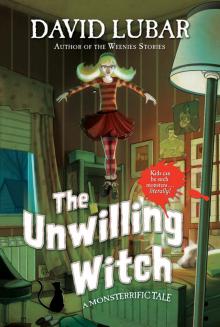 The Unwilling Witch
The Unwilling Witch Goop Soup
Goop Soup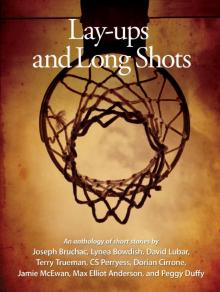 Lay-ups and Long Shots
Lay-ups and Long Shots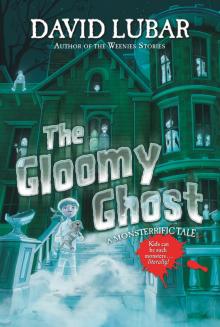 The Gloomy Ghost
The Gloomy Ghost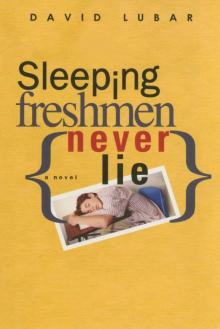 Sleeping Freshmen Never Lie
Sleeping Freshmen Never Lie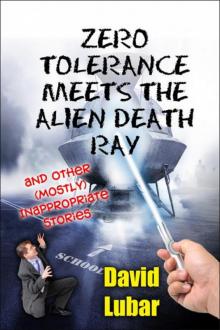 Zero Tolerance Meets the Alien Death Ray and Other (Mostly) Inappropriate Stories
Zero Tolerance Meets the Alien Death Ray and Other (Mostly) Inappropriate Stories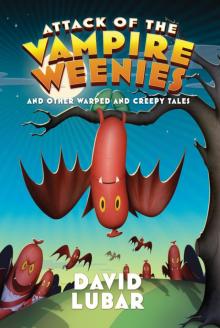 Attack of the Vampire Weenies
Attack of the Vampire Weenies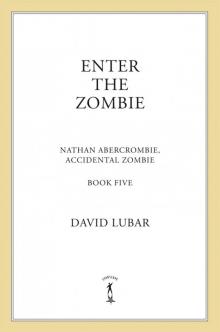 Enter the Zombie
Enter the Zombie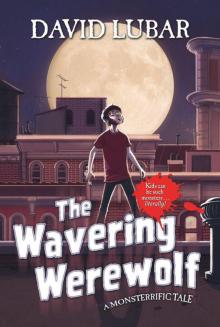 The Wavering Werewolf_A Monsterrific Tale
The Wavering Werewolf_A Monsterrific Tale The Curse of the Campfire Weenies
The Curse of the Campfire Weenies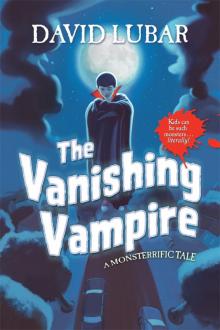 The Vanishing Vampire
The Vanishing Vampire